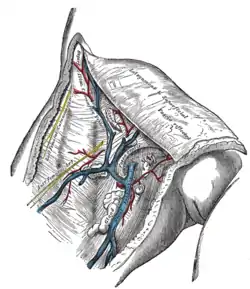| Cribriform fascia | |
|---|---|
 The great saphenous vein and its tributaries at the saphenous opening | |
| Details | |
| Identifiers | |
| Latin | fascia cribrosa |
| TA98 | A04.7.03.020 |
| TA2 | 2706 |
| FMA | 58735 |
| Anatomical terminology | |
The cribriform fascia, fascia cribrosa also Hesselbach's fascia is the portion of fascia covering the saphenous opening in the thigh. It is perforated by the great saphenous vein and by numerous blood and lymphatic vessels. (A structure in anatomy that is pierced by several small holes is referred to as cribriform from Latin cribrum meaning sieve).[1]
Clinical significance
The cribriform fascia has been proposed for use in preventing new vascularization when surgery is performed at the join between the great saphenous vein and the femoral vein.[2]
Eponym
When the eponym is used, it is named for Franz Kaspar Hesselbach.[3][4]
References
![]() This article incorporates text in the public domain from page 468 of the 20th edition of Gray's Anatomy (1918)
This article incorporates text in the public domain from page 468 of the 20th edition of Gray's Anatomy (1918)
- ↑ O.D.E. 2nd edition 2005
- ↑ De Maeseneer, MG; Philipsen, TE; Vandenbroeck, CP; Lauwers, PR; Hendriks, JM; De Hert, SG; Van Schil, PE (2007). "Closure of the cribriform fascia: an efficient anatomical barrier against postoperative neovascularisation at the saphenofemoral junction? A prospective study". European Journal of Vascular and Endovascular Surgery. 34 (3): 361–6. doi:10.1016/j.ejvs.2007.03.020. PMID 17513142.
- ↑ synd/3213 at Who Named It?
- ↑ F. K. Hesselbach. Anatomisch-chirurgische Abhandlung über den Urspurng der Leistenbrüche. Würzburg, Baumgärtner, 1806.
This article is issued from Wikipedia. The text is licensed under Creative Commons - Attribution - Sharealike. Additional terms may apply for the media files.